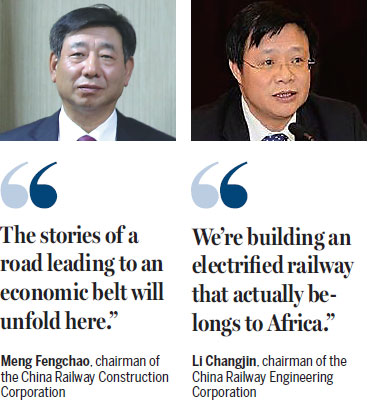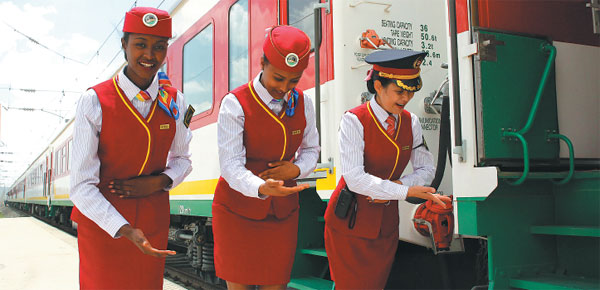Chinese-backed rail to enhance regional ties
Reading information from three screens in the cabin, Nebiyu Malaku could easily check the brake and operation systems, as well as the conditions outside and inside the locomotive of the first electrified crossborder train in Africa.
"We are ready to go," the 26-year-old assistant train operator told his Chinese colleague sitting next to him.
The track on which they drove extends 751.7 kilometers from Addis Ababa, the capital city of landlocked Eastern African country Ethiopia, to the Port of Djibouti. The track allows trains to travel at a maximum speed of 120 km per hour, and it was officially opened for operation on Oct 5.
During the past four years, two Chinese companies, China Railway Engineering Corporation and China Railway Construction Corporation, were contracted to build the railway for Ethiopia and Djibouti. The project has received total investment of $4 billion, including for locomotives and carriages.
For the next six years, the railway will be operated by the Chinese consortium, which has an exit strategy to train locals and build their capabilities so that they can take over the operation completely.

"I like the train too much," said Malaku, who graduated from Addis Ababa University and previously worked in administration at a motor company.
"The technology is new for Africa, not only for Ethiopia."
According to official figures, landlocked Ethiopia, the second most populous country in Africa, with an estimated population of 102 million, relies on the Red Sea ports of its neighbor, Djibouti, as major import and export gateways.
Ethiopia consumes 90 percent of the ports' throughput.
Djibouti, embracing both the Red Sea and the Gulf of Aden, is one of the most important hubs in the region, with links to Africa's landlocked areas, and can geographically counter the dominant position of the Suez Canal in Egypt.
A meter-gauge railway was built about 100 years ago, linking Ethiopia's highlands to the Horn of Africa country Djibouti with diesel locomotives. But, it has seen its services interrupted for years because of obsolete infrastructure and management issues. Meanwhile, the dilapidated road routes have limited capacity and journeys can take a week.
The new railway, financially backed by China and built by Chinese companies with Chinese standards and technologies, has a maximum of 20 million metric tons of transportation capacity per year. Ethiopia and Djibouti expect that it will carry 90 percent of all crossborder flow of goods.
The lifeline linking East Africa to the Red Sea is therefore described as the "new face of Africa" by the President of Djibouti, Ismail Omar Guelleh.
Xu Shaoshi, the special envoy of Chinese President Xi Jinping at the opening ceremony of the Addis Ababa-Djibouti Railway, said that the railway is a road of cooperation, of friendship, of development and also of prosperity.
He said the opening of the railway's operation is a milestone, as well as a new beginning, for the trilateral cooperation between China and the two countries.
The leaders of the Horn of Africa countries and Chinese companies echoed Xu's comments.
Li Changjin, chairman of the China Railway Engineering Corporation, said the group will share equipment, technologies and standards with the two countries and train local staff, while managing the railway's operation.
"In this way, we're building an electrified railway that actually belongs to Africa. We will help to build the railway systems and set an example showcasing the integration of railway design, construction and operation."
Meng Fengchao, board chairman of the CRCC, said he believes "regions along the railway will become part of an important economic belt for the two countries. The stories of a road leading to an economic belt will unfold here."
According to Meng, his group will engage in building trade and industrial zones, investment in mining, real-estate development and logistics businesses around the railway in order to comprehensively merge into Africa's business development.
wanghuazhong@chinadaily.com.cn
|
A Chinese manager shows her African colleagues how to greet passengers boarding the train linking Addis Ababa and Djibouti. Wang Huazhong / China Daily |


(China Daily 10/12/2016 page12)









